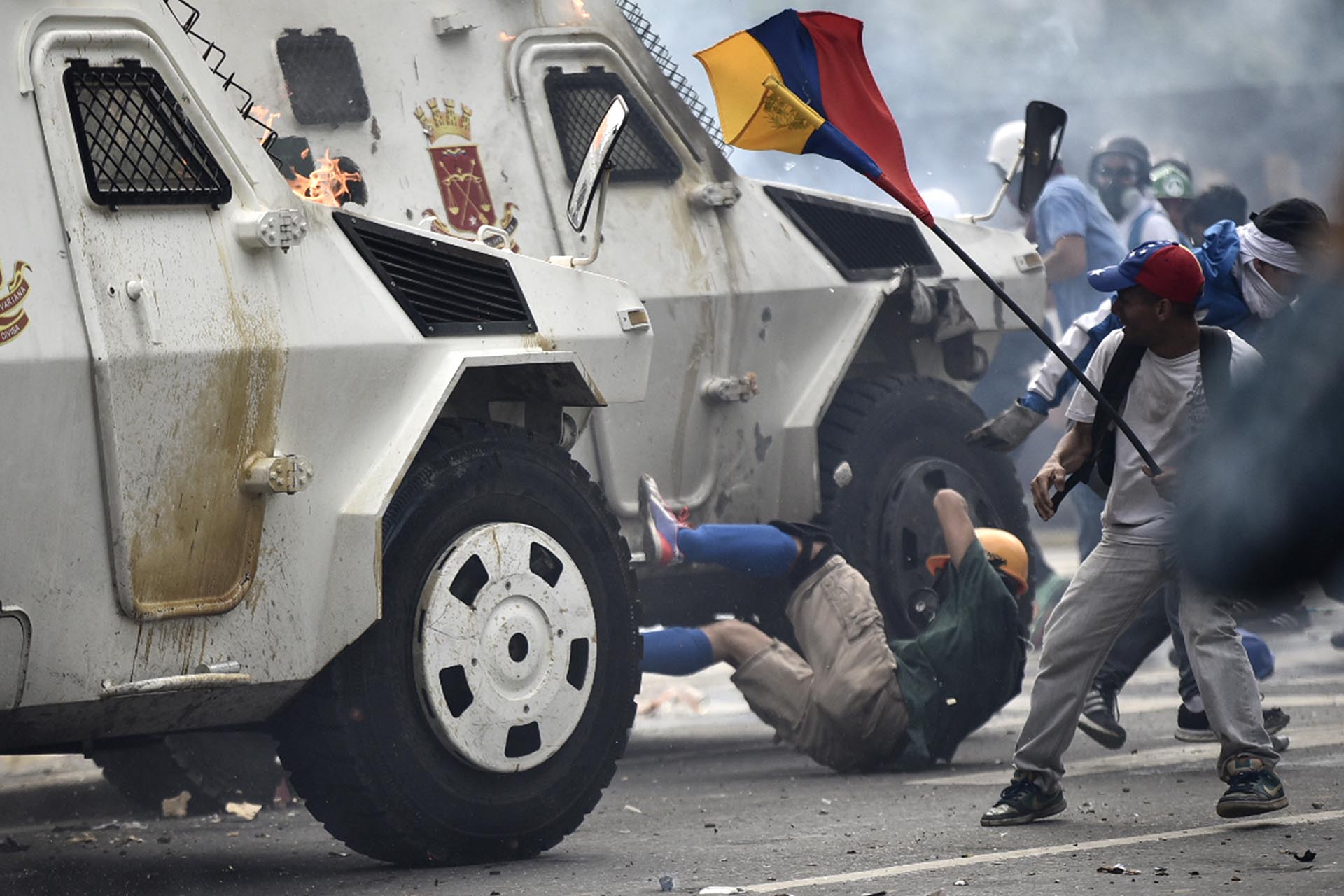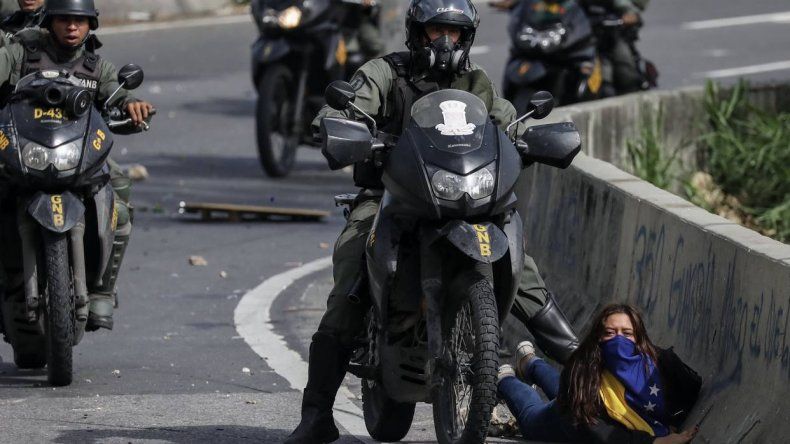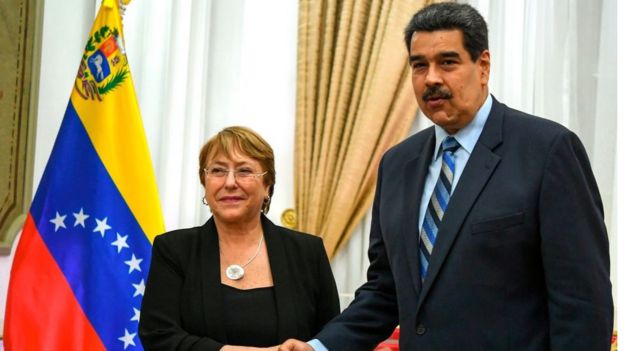Crisis in Venezuela: The devastating conclusions of Bachelet's report on the situation in Venezuela
A report issued by the United Nations High Commissioner for Human Rights on the situation of Human Rights in the Bolivarian Republic of Venezuela was presented on July 04th 2019.
For her report, Michelle Bachelet, who visited the country between June 19th and 21st, interviewed more than 558 people, most of them victims of abuse and witnesses.
For her report, Michelle Bachelet, who visited the country between June 19th and 21st, interviewed more than 558 people, most of them victims of abuse and witnesses.
The government of Nicolás Maduro rejected Bachelet's conclusions as "not objective or impartial" and presents a "selective and openly biased view of the true situation of human rights" in the country.
"Corruption" in a country with 3.7 million malnourished
Bachelet concludes that in Venezuela the economic rights of citizens are also violated.
"The diversion of resources, corruption and lack of maintenance in public infrastructure, as well as underinvestment, have resulted in violations of the right to an adequate standard of living, among others, due to the deterioration of basic services such as public transportation and access to electricity, water and natural gas" says the report.
The right to food of Venezuelans is not going through its best, according to the conclusions of the report, which states that "the main food assistance program, known as 'CLAP boxes', does not cover the nutritional needs that are essential for people".
The government of Nicolás Maduro repeatedly denied that Venezuela suffered any humanitarian crisis.
In recent times it has begun to accept the help of organizations such as the Red Cross, but it maintains that the economic problems of the country are due to economic sanctions and "the criminal blockade" imposed by the United States.
The commission's report also addresses this issue and recalls that "the Venezuelan economy, especially its oil industry and food production systems, were already in crisis before any sectoral sanctions were imposed."
The figures it collects give an idea of the magnitude of the problem. It estimates that between November 2018 and February 2019, "1,557 people died due to lack of supplies in hospitals."
Through a document released on July 4th, the government of Nicolás Maduro submitted 70 "observations" that account for what he considers to be errors contained in the Bachelet report.
The report includes the closure of dozens of print media, radio stations and television channels, as well as the increase in the arrests of journalists, including those of foreign journalists who ended up being expelled from the country.
When asked by journalists, Bachelet explained that there is no deadline to comply with the numerous recommendations made by his Office. This gives the government more time to try to overcome the countless problems it faces before the international community.
Human Rights Watch: Torture of Presumed Conspirators (video)
Ten things you should know about the human rights crisis in Venezuela
Amnesty International - February 2019The human rights crisis that has affected Venezuela for some years has destroyed the lives of millions of people. This is what you have to know:
1. Massive protests
The origin of most of the current disturbances in Venezuela can be traced back to March 29th 2017, when the Supreme Court of Justice, with the backing of President Nicolás Maduro, took control of the National Assembly, where the majority of the seats are of the opposition. That triggered massive protests between April and June that were suppressed by the Maduro government.
According to the Venezuelan Observatory of Social Conflict, in 2018 the record of 12,715 protests was reached throughout the country. These have continued in 2019, after the president of the National Assembly, Juan Guaidó, called mass demonstrations against Maduro.
2. Excessive use of force
Between April and July 2017, more than 120 people died, some 1,958 were injured and more than 5,000 were arrested in mass protests. In the Amnesty report Nights of terror: Illegal attacks and raids on homes in Venezuela, the organization revealed how Venezuelan security forces and armed civilian groups endorsed by the government violently burst into people's homes to intimidate them and thus discourage them from participating in demonstrations or any other form of protest.
From January 21st to 25th, at least 41 people died in circumstances linked to the mass protests, all of them from bullet wounds. More than 900 people were arbitrarily detained.
3. A policy of repression
Although the state authorities have been applying a systematic policy of repression throughout the crisis, recent guidelines indicate that it is intensifying.
The recent investigation carried out by Amnesty International showed that Venezuelan security forces under Maduro had carried out targeted executions as their policy of repression had been extended. This situation especially affected impoverished areas of Caracas and other parts of the country, where the victims were later presented as "delinquents" killed in clashes with the authorities.
Of the 41 victims killed in the context of protests in early 2019, Amnesty International documented six extrajudicial executions by security forces backed by the State and excessive use of force by authorities under the command of Nicolás Maduro.
In the 2018 report This is not life: Citizen security and the right to life in Venezuela, Amnesty revealed that the security forces used lethal means, with the intention of killing, against the most vulnerable and socially excluded people in the country under the pretext of " fight crime. "
4. Youngers in custody
State authorities have been using the justice system to illegally harass those who think differently from them. According to the Venezuelan organization Foro Penal, between January 21st and 31st 2019, 988 people were arbitrarily arrested. Among them were 137 children and adolescents, of whom 10 are still in custody. Allegations of torture and other ill-treatment of detainees have also been received. As of January 31st 2019, Penal Forum estimated that there were 942 people detained for political reasons. Although many have been released, most of them still face trial.
5. Civilians tried in military courts
People detained for participating in protests are often tried by military courts, which is contrary to international law. The people prosecuted face, among others, charges related to association with the intention of instigating the rebellion and attack on a sentinel, designed expressly for military personnel, which is another proof of the authorities' determination to silence dissent. According to Foro Penal, 817 people were tried in military courts between April 2017 and January 2019.
6. Three million refugees and migrants
It is estimated that more than three million people have fled Venezuela since 2015, the equivalent of 10% of the population, according to UN figures. Most have sought refuge in Brazil, Chile, Colombia, Ecuador and Peru. Most mentions the denial of their rights to health and food as the main reason to leave the country. In other words, they flee to protect their life. Amnesty International has urged the governments of Latin America and the Caribbean to give Venezuelan refugees access to asylum procedures in their countries.
7. Repression of freedom of expression
There have been numerous reports of violations of the right to freedom of expression, such as the arbitrary detention and / or expulsion of at least 19 people working in the media, both Venezuelan and foreign. In January 2019, at least 11 journalists were detained in a single week, and many of them were expelled or deported from Venezuela, including Jorge Ramos and his team from the Univision TV network. Censorship and orders to close radio stations are widespread practice. The government closed 50 media outlets in 2017.
 |
| UNICEF / Santiago Arcos |
8. The economic debacle
According to the National Assembly, in 2018 inflation was a shocking 1,698.488%. The International Monetary Fund (IMF) calculates that, in 2019, the annual inflation rate will reach 10,000,000%. Meanwhile, the official minimum wage in Venezuela is USD 6 per month. And these are the income of a large part of the population. The inevitable result is that many people can not afford basic products.
The shortage of basic supplies such as food and medicine has left millions of people living in alarming conditions that get worse every day. The measures adopted by the state authorities have affected salaries and the rights of working people. Until 2013, the Venezuelan authorities made great progress in the area of economic and social rights, but this trend has been reversed categorically in recent years.
9. The government denies it
Nicolás Maduro has repeatedly denied that the country is experiencing a human rights crisis. What is more harmful, refuses to recognize the shortage of food and medicine. The few official public statistics on the welfare of the population contrast with the reports of independent agencies.
Given that the authorities deny that there is a shortage, they have not accepted the international humanitarian aid that has been repeatedly offered. This has a catastrophic effect, especially on the most vulnerable people.
10. Harmful US sanctions
On January 28th, the US government announced new measures that prevent the Venezuelan state oil company from exporting crude oil to the United States, while prohibiting US suppliers from selling the products Venezuela needs to process its heavy crudes. Given that the Venezuelan economy depends to a large extent on the export of oil and that the United States is one of the main trade partners of Venezuela, it is likely that these measures will make the life of the people living in the country even more difficult.






No comments:
Post a Comment